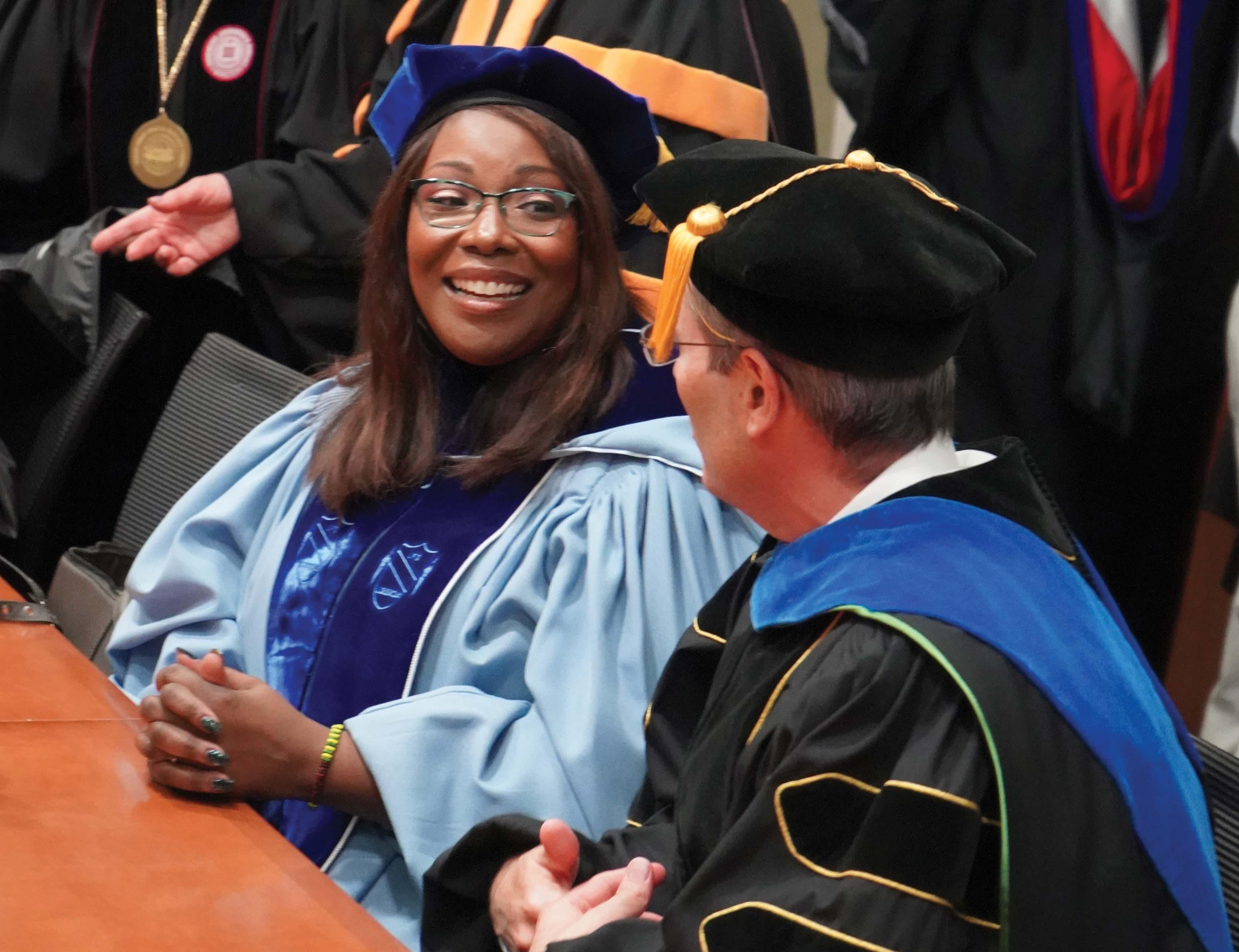A Rich Past & Remarkable Future

A Rich Past & Remarkable Future
Joseph Williams, MSU’s first president, dubbed the college “an experiment” that was “established on no precedent, it is alike a pioneer in the march of men and the march of the mind.” This spirit—of a community brought together with a sense of determination, passion and purpose—has animated MSU from the beginning. But the modern world requires more if MSU is to make the difference its mission mandates.
February 9, 2022Eight days after the first known case of the coronavirus in the United States grabbed our attention, a group of Spartans was gathered at the Grand Central Air Terminal in LA. They came to meet the university’s new president, Samuel L. Stanley Jr., M.D.
During the Q&A Stanley was asked, “What are your thoughts on this virus?”
“I’d like to know more about its R-naught value,” he said. R-naught is a value given to predict the “spreadability” of an infectious disease. As a biomedical researcher with significant work in infectious diseases and patents in immunology, Stanley knew what he was talking about.
In the months that followed we would all learn much more about COVID-19.
In March 2020, the pandemic sent thousands of Spartans home to study and teach. MSU adapted quickly with modifications to in-person learning. And MSU researchers stepped up to improve early detection techniques, capacity for testing and a process for cleaning and extending the use of N95 masks protecting frontline health care providers.
During the 18 months away from campus, national attention to social issues of racism, health disparities and income gaps ignited calls for change, demonstrating the important role of higher education and the unique obligations of public universities.
President Stanley’s infectious disease research background and his efforts to promote diversity, equity and inclusion informed MSU’s response to the COVID-19 pandemic and set the stage for the university’s future.
By fall of 2021, MSU reported a vaccination rate of 90%, allowing a return to campus for thousands, including the largest incoming class of first-year students in the school’s history.
Stanley was selected to be MSU’s 21st president in May 2019, and his appointment would prove to be more than fate—it was crucial.
A Legacy of Action
In the wake of World War II John Hannah, Michigan State University’s 12th president, laid out a vision for a university not only for the people of Michigan but also for the world. His vision, incredible during its time, was one of a globally interdependent future. It led to the university’s involvement in building institutions of higher education in places such as Brazil, Colombia and Okinawa in the 1950s, and Nigeria and Pakistan in the early 1960s. He and the leaders around him were known for looking around the curve. That thinking paved the way for growing dozens of research and academic programs in which MSU ranks among the best today.
MSU’s articulation of its strategic intent and goals is of equal importance today.
“To be among those few institutions that have the capacity and aspiration to change the direction of things in our world is remarkable,” said Stanley. “We should all be proud to be part of an institution with a unique combination of elements that allow us to rise up—bend the curves and change trajectories that make the world a better place for everyone.”
By 2030, we envision a Michigan State University that has significantly expanded opportunity and advanced equity, elevated its excellence in ways that attract vital talent and support, and has a vibrant, caring community.
Rising to the Challenge
Michigan State’s aspiration builds on its past. But to remain among the most impactful universities— one that lifts people up, addresses issues that matter to people’s lives and livelihoods, and fuels the pipeline of innovation with discovery and invention— requires intention. It also requires a reckoning with the challenges of a changing environment, including uncertain state and federal funding, demographic shifts, changing perceptions of higher education and its value, increasing competition for talent and technology transformation touching every aspect of operations.
A bold new plan was needed. Stanley didn’t waste time. Shortly after his arrival a steering committee was formed and work began on MSU 2030: Empowering Excellence, Advancing Equity and Expanding Impact.
Amid the stress of the pandemic, MSU continued to strategize and plan, harnessing new lessons learned to ensure that the university was prepared not only to respond, but also to lead in a future landscape shaped by many forces, a landscape forever changed by our collective experiences.
Implementation of the strategic plan will focus investment in areas of excellence that address global challenges; meet pressing needs expressed by communities in Michigan, across the nation and around the world; advance equity and ethics; and improve the human condition.
Engaging stakeholders, including alumni, was critical in MSU’s process.
“We have so many successful, smart, savvy and engaged alumni who have something to tell us about what the world needs, and as we continue to work within this strategic framework we intend to invite them to the conversation,” said Nick McLaren, executive director of the Michigan State University Alumni Office.
MSU is often called Michigan’s State University, and for good reason. MSU enrolls more Michigan students than any other university—approximately 35,000—and more than 275,000 of its more than half a million alumni live in the state. Together, its human health colleges provide 20,000 doctors and nurses to help Michigan’s citizens stay healthy. Our total economic impact in Michigan is $5.6 billion annually, and the Innovation Center helps nearly 130 discoveries become patented products or startup companies each year.
Engaged Alumni and Friends
Michigan State has created diverse opportunities for alumni and friends to meaningfully engage with the university, from helping to recruit new Spartans and serving as mentors and role models, to providing internships and supporting MSU through financial investments at all levels.
Continuing a rich tradition of investment in MSU, more than 250,000 alumni, friends and organizational donors gave more than $1.8 billion in the university’s most recent comprehensive campaign—Empower Extraordinary—including support to establish more than 100 new endowed faculty positions (enabling the recruitment and retention of some of the best minds in their fields) and more than 3,500 new scholarships. MSU is building on this momentum to increase philanthropic support.
The university will plan and initiate its next campaign to advance MSU’s margin of excellence in support of the pillars of its strategic plan with a focus on:
- Significantly increasing student success across diverse platforms
- Strengthening faculty academics and engagement
- Magnifying creative research outcomes for the betterment of our global society
- Intensifying programmatic impact with the exchange and exploration of new ideas









